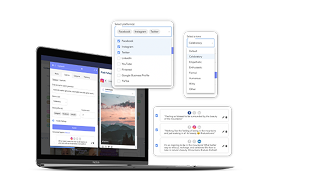Social Media Scheduling
Social Media Reporting & Analytics
Social Media Management by Vertical
White Labeling Explained: Unlock Growth Through Partnerships
White labeling is a business model where one company produces a product or service that another company markets under its own brand. It enables businesses to extend their portfolio without the need to build products from scratch. Below, we break down the key concepts, benefits, and challenges of white labeling—tying in insights from the article:
What is White Labeling?
Core Concept:
White labeling involves rebranding an existing product or service. The producer creates a solution that the reseller then customizes with its own branding. The end customer interacts only with the reseller’s brand, while the behind-the-scenes producer remains invisible.Real-World Example:
Think of store-brand products found in supermarkets—the supermarket's brand is visible on the product packaging, yet another company manufactures the product.
How White Labeling Differs from Other Models
Private Labeling:
Often involves more extensive customization and is typically exclusive to one retailer. Unlike white labeling, the product might be tailored specifically for one retailer’s needs.Reselling:
The reseller sells the product as-is without any rebranding. In this case, the customer is aware of the original manufacturer.Licensing:
In licensing, the seller uses someone else’s intellectual property (often acknowledged with “powered by” or “made by” messages), letting the customer know the origin of the technology or product.
The White Label Process
As explained in the article, the white label process can be broken down into the following steps:
- Product Creation:
A producer designs a customizable product or service. - Rights Purchase:
The reseller buys the rights to rebrand the product. - Customization and Rebranding:
The reseller applies its branding and might add custom features. - Market Under Own Brand:
The product is then marketed and sold as if it were developed in-house. - Backend Operations:
The producer manages backend operations, updates, and support (though support responsibilities should be clearly defined in the agreement).
Example: A digital marketing agency might white label a social media management platform. Clients see the agency’s branding on the dashboard, while the third-party provider maintains the technology and backend support.
Benefits for Digital Marketing Agencies
White labeling is particularly appealing for digital marketing agencies because it allows them to:
Expand Service Offerings Quickly:
Agencies can offer sophisticated tools (e.g., social media, SEO, email marketing) without the overhead of developing these solutions themselves. For instance, they can choose to build or buy white-label SMM integration based on their specific needs and resources.Focus on Core Competencies:
By outsourcing technical development, agencies can concentrate on strategy and client relationships.Enhance Client Experience:
Clients receive a seamless, branded experience with unified reporting and support.Improve Client Retention:
A diversified service offering increases dependency on the agency, reducing the likelihood of clients switching providers.
Evaluating the White Label Strategy
When considering white labeling, it’s essential for businesses to evaluate several factors:
Quality and Brand Alignment:
Verify that the white label product meets your quality standards and fully aligns with your brand promise. Without robust customization options from the provider, mismatches could harm your reputation.Customer Support Structure:
Clarify who handles customer support. Although the producer often manages backend operations, front-facing support should be clearly defined in your partnership agreement.Financial Model:
Analyze the margins—whether the agreement includes a flat fee, percentage-based pricing, or another structure. Establish that the financials offer a compelling profit margin compared to in-house development. For more insights, you can explore how to price white-label software.Client Demand:
Assess whether your clients truly need this service. Conduct surveys or interviews to confirm demand before committing to a white label solution.
Tying It All Together
The full article, "White Labeling Explained: Unlock Growth Through Partnerships," reinforces that white labeling is more than just a cost-saving measure—it’s a collaborative approach to growth. The article emphasizes that:
White labeling is not merely rebranding.
It represents a strategic partnership that leverages the specialized strengths of another company while seamlessly extending your own brand’s promise.Evaluating Potential Partners is Essential:
Ask key questions regarding service reliability, update processes, customization options, data ownership, and support structures.Making the Decision:
White labeling is a viable strategy when you need to expand services quickly, ensure quality alignment, and see financial benefit. However, if margins are too tight, if quality is compromised, or if transparency is a priority for your clients, it might not be the right choice.
Final Thoughts
White labeling offers an efficient and flexible pathway to business expansion—particularly for digital marketing agencies. By rebranding a proven solution, agencies can deliver high-quality, diverse offerings without the overhead of in-house development. The success of such strategies hinges on thorough evaluation of quality, customization, financial viability, and proper support structures.
Whether you're a digital marketing agency looking to broaden your service menu or a business seeking to provide comprehensive solutions, white labeling can unlock growth through strategic partnerships. By following the best practices and considerations discussed above, you can make an informed decision that aligns with your business goals and brand values. To learn more about how to effectively scale your agency using white-label SaaS solutions, check out this guide: How to Use White-Label SaaS to Scale Your Agency.
For more insights and resources on white labeling and other digital marketing strategies, visit CloudCampaign.
FAQ's
What exactly is white labeling in digital marketing?
How does white labeling typically work in digital marketing?
What are the main benefits of white label digital marketing services?
Are there any potential risks with white labeling?
How do I choose the right white label digital marketing partner?
What services are most commonly white labeled in digital marketing?
How should I price white label services for my clients?
Have more questions? Submit a request

CaptionAI: The free and easy social media caption generator
Generate engaging social media captions effortlessly with our ChatGPT-powered AI writing assistant.
.png)



